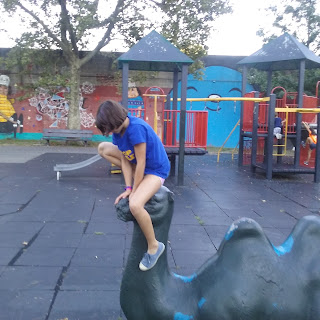 |
| Top, street art in Bushwick, middle kenny scharf, and bottom, the author on a haunting night with LM Bogad |
"I haven't fucked much with the past, but I've fucked plenty with the future,"
Patti Smith.
I spent much of the weekend going to book readings, playing with the kids, reading about the continuing treachery of the world, seeing mom and friends around town. Thursday, I joined LM Bogad's post reading hang out for his new work, Tactical Performance, Friday, I took in a talk by Joseph Alexiou on his book Gowanus: Brooklyn's Curious Canal, and Sunday, our Activist Informed Reading group discussed Please Kill Me: An Oral History of Punk. Reading it, I was reminded of the years of thinking about punk when i was a kid, the format of the book, like Studs Terkel's oral histories, a montage of DIY ideas, colors meshing through times, movements ebbing from the beats to the factory, Patti Smith to William Burroughs, poetry uptown, downtown, and even CBGBs. JC recalled meeting Legs McNeil at Penn Station, giving him a ride on his pedicab, learning about the book. Its his favorite book about New York City. He proudly showed us his autograph copy.
Punk was the first movement I felt like I was a part of, hurling my body from the stage as the Dead Kennedy's played "Holiday in Cambodia" in Dallas in 1983. Leaping through the air at the show, a new community caught me, inviting me into a new way of being a part of something larger than myself. It was a way of looking at the city, the streets, their aesthetics, bodies of ideas in space. Growing up, I found myself drawn to other movements, but punk, book shelved between the beats and ACT UP, inspired and invited me to look at the city in a new way. In many ways, its paintings, the Kenny Scharf surrealistic graffiti, its burning ambitions, and lust for something larger, brought here. This montage of ideas, of photos we can rearrange, into new shapes and stories, continues to inspire.
Like all movements, punk had its flaws and blind spots, macho attitudes, flirtations with racism and fascism as well as liberating impulses. Like the movement it represents, Please Kill Me is anything but a perfect book. Its selectively endorses those in Legs' universe, omitting more political players who saw the music as a part of a larger cultural ethos. This is Legs' collective mythology. Still, its image of a movement as a montage of stories, feels like an ideal means to convey some of the hopes of the movement battling boredom and oblivion.
We met in the Elizabeth Street Garden, for our discussion, talking the fate of the garden, the city hopes to destroy. "The city can't destroy this place, its beautiful," noted Monica, sharing stories about her tour with the Living Theater.
"Thanks for coming," smiled Jeannine Kiely, one of the organizers for the garden. She reminded us all to attend the Rally before the developer meeting Thursday, October 6, 9:00-10:30am
City HPD Agency Office, 100 Gold Street.
The city is always changing, ebbing and flowing, with tragedy overlapping with comedy. Hopefully this garden will not disappear.
Looking at the statues standing between the garden and oblivion, we planned and recalled what this movement has meant and continues to mean to us. Owen recalled getting here in 1978 going to CBGBs. I remembered the Ramones shows i flocked to, the Avengers records i listened to in the 1980s, and some of the political bands not included in the book.
Still, Legs points toward an impulse toward freedom: "Punk was like, this is new, this is now, the apotheosis, powerful. But it wasn't political." I'm sure Joe Strummer would have disagreed with this point. Still, "it was about freedom, personal freedom. It was also about doing anything thats gonna offend a grown-up. Just being as offensive as possible. Which seemed delightful., just euphoric. Be the read people we are. You know? I just loved it. I remember my favorite nights were just getting drunk and walking around the East Village kicking over garbage cans. Just the night. Just the night. Just that it would be night again. . And you could go out, you know. It just seemed glorious. And you'd be humming these great songs and anything could happen., and it was usually pretty good. You'd pick up some chick. You'd have an adventure. You'd go to some fantasy where you've never been before," p. 299.
Next session we'll read Notes of a Native Son. Just like Baldwin's Harlem and Benjamin's Berlin, these stories and memories, we are marking our moment. We were here, have been here.
For a weekend, the collective daydream of the story Legs traced felt everywhere, splashed against the walls of Bushwick where I walked all Saturday, looking at broken glass everywhere, paint on the walls, poems everywhere in this concrete jungle.
 | |
| Owen Crowley photo of AIR - Ben, Monica, and JC. |
























































































No comments:
Post a Comment